Cultural Resources
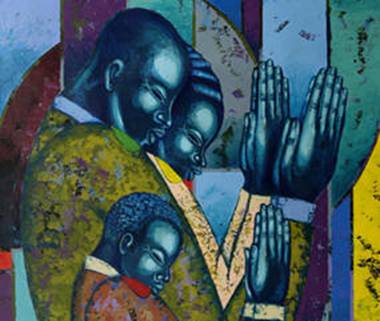
CHRISTIAN EDUCATION SUNDAY
CULTURAL RESOURCES
Sunday, May 29, 2011
Edward J. Robinson, Guest Cultural Resources Commentator
Pastor of the West End Church of Christ, Terrell, TX
I. Introduction
Enslaved African Americans understood the power of literacy. They recognized that the ability to read was crucial to their humanity, dignity, and liberty. After Thomas Auld sternly prohibited his wife from instructing Frederick Douglass, the prominent abolitionist reflected that “I now understood what had been to me a most perplexing difficulty—to wit, the white man’s power to enslave the black man. It was a grand achievement, and I prized it highly. From that moment, I understood the pathway from slavery to freedom.”1 Douglass realized that white slaveholders subjugated black people by keeping them ignorant; and he correctly concluded that if enslaved Africans learned to read they would eventually agitate for freedom.
Booker T. Washington, the black educator, recalled that upon obtaining their freedom, many formerly enslaved Africans yearned to acquire not just literacy, but biblical literacy. “The great ambition of the older people,” Washington observed, “was to try to learn to read the Bible before they died.”2 African American senior citizens not only realized the value of literacy, but they also saw the importance of biblical literacy.
Timothy’s mother and grandmother gave a sound spiritual foundation upon which to build. They imparted to him a “sincere faith” (2 Timothy 1:5). Beyond that, his mother and grandmother furnished him with a working knowledge of Scripture because Timothy had become biblically literate “from childhood” (2 Timothy 3:15). Christian education should begin at home. God said through Moses: “And these words which I command you this day shall be upon your heart; and you shall teach them diligently to your children, and shall talk of them when you sit in your house, and when you walk by the way, and when you lie down, and when you rise” (Deuteronomy 6:6-7).
Even though the Church and Christian schools can complement and supplement the work of providing moral and spiritual guidance for young people, there is no substitute for furnishing it to children in the home. When we rely solely on and relinquish fully to the Church and the Christian or secular school the responsibility of providing biblical guidance to God’s people, especially His young people, we abdicate our parental obligation. The answer to the problem of biblical literacy and lack of moral knowledge is not in the schoolhouse or even in the White House; the answer is in your house. Joshua said it well: “And if you are willing to serve the LORD, choose this day whom you will serve, whether the gods of Amorites in whose land you dwell; but as for me and my house, we will serve the LORD” (Joshua 24:15).
That is the purpose of Christian education. It is designed to mold us, to shape us, to educate us, and motivate us to serve God more fervently and more faithfully. Like Ezra, we should set our hearts “to study the law of the LORD, and to do it, and to teach his statutes and ordinances” (Ezra 7:10). The pursuit of Christian education must not be done to impress others or to engender a sense of pride in ourselves. We should instead seek to increase and enhance our biblical knowledge so that we might please God, aid others, and live as Christian examples.
The apostle Paul challenged Timothy to use his Christian education to live righteously in an unrighteous society. In a morally corrupt and decadent world, pervaded by self-lovers, money-lovers, and pleasure-lovers (2 Timothy 3:1-4) as well as deceivers who tricked others and themselves (2 Timothy 3:13), Paul knew that Timothy could be an effective minister and a good example for other Christians because he was morally upright and biblically astute. If our young people are to overcome the attacks of Satan, there is no substitute for their being rooted and grounded in the Word of God. No wonder the psalmist asked, “How can a young man keep his way pure?” He then answered his own question: “By guarding it according to thy word” (Psalm 119:9).
For the psalmist, the law of the Lord was “perfect,” “sure,” “right,” “pure,” “clean,” “true,” and more desirable “than gold” (Psalm 19:7-10). For the apostle Paul, Scripture was divine in that it was inspired by God (2 Timothy 3:16). The word “inspired” actually means “God-breathed.” Because of its divine nature and quality, Scripture provides for Christians at least three critical elements. First, Scripture is didactic because it gives us spiritual guidance and direction. Second, it benefits Christians in the area of discipline; it is the believer’s rod of correction when he or she goes astray. Third, it is a source for developing godly character or “training in righteousness.”
So, if I had to define Christian education now, here is what I would say:
Christian education is the Christian Church in teaching mode. This includes: the sermon as a teaching vehicle, Bible Study classes, Sunday School classes, New Member classes, Christ-centered conferences and workshops, denominational training classes, seminary training classes, Bible School classes, culture and theme-based Christian education classes, worship services, prayers, training of church officers and leaders, communion, baptism, ordinations, manifestations of stewardship, funerals, weddings, infant dedications, music, and all other moments in the life of a church when it acts to inform and transform persons for the up-building of the Kingdom of Christ, the church, communities, and society.
II. Twenty-first Century Christian Education in the African American Church



What is your aim as a Christian educator?
All Christian educators should know why they do what they do and should ask: When I teach, what do I want to achieve? What am I attempting to do? WHAT IS MY AIM?
1. Are you guiding people through the reading of biblical passages and transferring biblical texts into the minds of students (getting people to remember Scriptures)?
2. Are you teaching to make people witnessing disciples and servant leaders?
3. Are you teaching so that people can identify their own story within Bible stories as they read and hear them? Are you teaching people about biblical characters to help them develop the qualities of those biblical characters?
4. Do you teach to transmit information about the Bible and what it contains?
5. Do you teach to form and transform persons in the Church so that they will transform the Church and the world?
GOOD TEACHERS DO ALL OF THE ABOVE. However, most teachers intentionally work to achieve the first aim but not the last.
African American theologian Peter J. Paris wrote: “Thinking and acting in collaboration with adequate economic and sociopolitical theories is a sine qua non for effecting social change in the twenty-first century. Seminaries, divinity schools, colleges, and universities could provide many of the most needed resources for study and the dissemination of knowledge. Such a working alliance with institutions of higher education would be an innovation for the African American churches and a challenge to their charismatic style of leadership. Yet, it would also help the churches overcome their person-centered ministries, on the one hand, and their anti-intellectual dispositions, on the other hand. Most important of all, it would help them discern the relevance of appropriate scholarly knowledge for good action leading to social transformation. Such activities would also help the churches develop a rational critique of an economic system that relegates many millions of people to a permanent underclass. How to help the nation discern persuasive ways to eliminate the intergenerational nature of poverty is the single most important task facing African American religious institutions in the twenty-first century.”3 Teaching with this type of awareness is teaching to form and transform persons in the Church so that they will transform the Church and the world.
Paris then discusses the “privatist, holiness, spiritualist model.” This model focuses on personal evangelism and self-development in the context of the socioeconomic status quo. Unfortunately, this last model represents the fastest-growing element in contemporary African religion today both on the continent and in the American diaspora. As long as this trend persists, the African churches present no threat to the socio-political-economic status quo. Again, we need to teach in a way that forms and transforms persons in the Church so that they will transform the Church and the world.
However, just as this model represents a dark time in the life of the African American church, it also represents a grand opportunity for Christian education in the African American church! To understand why, let’s go back before going forward. Those who grew up in the African American Protestant Sunday School classes of the 1940s–1970s well remember the Socratic Method classes where a teacher stood in front of the class and departed information that students were to remember. The classes, especially those of adults, were simple, and the aim was to teach a Bible story and a biblical truth toward helping students to learn the Bible and the characteristics of what it took to be a Christian with whom Christ was pleased. The rooms were typically simple and sparse or the class met in areas of the sanctuary. Sometimes colored materials and maps could be found in the classes for children and youth. Now, fast forward to 1990, and all over the country you could hear black preachers announcing the funeral of their Sunday school and most other aspects of their Christian education department. Why? Well, the reasons are numerous, but I believe they can basically be summed up accordingly: The teaching styles were not innovative or interesting; the material was not culturally and socially relevant to the issues students faced in their daily lives; and Christian education was no longer a priority. It had been placed behind churches gaining larger buildings, marketing themselves and adopting the “privatist, holiness, spiritualist model” of worship and church mentality.
a. Innovative Teaching Styles
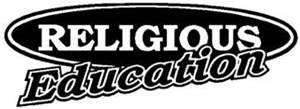




Although it is 2011 in the rest of the world, in too many African American Christian education departments it is still the 1980s or earlier. In our homes we have televisions on which we play games, pay bills, listen to music, and even watch television shows. We use cards to get cash and do so much more instead of checks. Then, there are the aps—they are everywhere for almost everything, and if you don’t see the one you need—just wait for it, it will be available soon. Our kids are fascinated by music; hip hop is the primary soundtrack of their lives. But for a variety of reasons, none acceptable, Christian education departments refuse to use branding (including logos), music, the web, computers, or aps to teach! This must change. Dead and dying Christian education departments will not grow and thrive without innovative teaching methods from innovative teachers.
We have entered the technological era and it is here to stay. How can you make your class more technologically up-to-date, especially if you have little knowledge of technology? Ask for help from those who have the know-how. Youth and young adults love working with the latest technological gadgets. They can tell you which ones are used in classrooms, what they cost, and how they work. The most common technological item now used in classrooms is the laptop. It is used to access the web, to allow teachers to show Power-Point presentations, to download material, and to download music from the web.
The research is plentiful that shows that students of all ages learn in classes that are interesting and exciting. There are many ways that the black church innovate its teaching styles. Three come to mind for small churches (those with less than 200 people). One: Begin with small but noticeable steps such as bringing a laptop into your classrooms and Googling terms that you are studying. Teachers, make sure that you have looked up the terms prior to your class. Two: Brand your Christian education department. Great logos are easy to do and people will notice a good logo. Likely, your church has a logo. Maybe it’s just an image of your church. That’s fine. Use it along with eye-catching typing fonts during all teaching moments and all materials and make it colorful. Three: Use music especially when teaching children and youth. In fact, if you want them to learn the books of the Bible, learn select Scriptures, and information about biblical characters, have them write songs and present them in class; that’s innovative teaching!
b. Culturally Relevant and Liberating Christian Education Materials

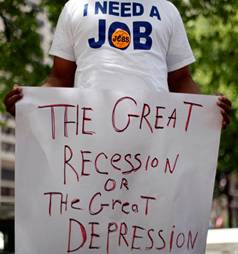



In order to turn around our Christian education departments, what we teach must be culturally relevant and liberating. The African American community is still suffering the ill effects of knowing too little about its cultural heritage. The unemployment rate in our community was almost double the national average in 2010. Violence is still rampant in our communities and is destroying the lives of far too many. From bullying to domestic violence to illiteracy, our children and families are deteriorating rapidly. With all of these important issues before us, in too many instances what we teach bears no relationship to the real lives of our parishioners. Why do we find it so difficult to teach about Africa historically and modernly using the Bible? There is so much in the Bible and the geography of the Bible that will allow us to do so. If the subject matter is faith, why not talk about the type of faith needed during the worst recession since the Great Depression? Since there are stories of violence, rape, domestic violence, and more in the Bible, why not use the Bible to discuss these difficult modern subjects?
If the teacher is not knowledgeable in an area, this is a great opportunity to bring in an expert. Your community is filled with them. Invite them to a class. Imagine having a rape crisis counselor speak to one of your classes after the class reads about the rape of Tamar. Imagine having a person who was once wealthy and became homeless and then overcame his or her situation talk to your class after the class has read the story of Job. You can also use movie clips to bring alive today’s issues as you teach the word of God.
c. Breaking out of the Privatist, Holiness, Spiritualist Model
The privatist, holiness, spiritualist model is a model of doing Church that intentionally and sometimes unintentionally maintains the status quo. Its focus is on worship and personal spirituality. The community and the nasty issues of the world are an afterthought, if thought of at all. The Christian education efforts of churches that adhere to this model will have limited success training students.
It is not enough to teach people to live out the fruit of the Spirit and to be faithful, honest, courageous, just, kind, forgiving, long-suffering, etc. if their gaining of these characteristics is not regularly lived out in community. For it is only in community that we find our enemies who are to be forgiven, the king (politician, rich person) who is to be deposed, the child who is to be saved from cruelty, the criminal who is on his way to hell unless someone throws him a lifeline, and so many others who can only count on the People of the Way to help them find their way.
So, those teachers who want to revitalize their Christian education departments must concentrate less on students who can stick out their chest and say “I know the Bible and I am holy” and more on students who will say in humility, “I am learning from this class how to be a greater disciple; I am trying to make at least my corner of the world a better place by living as a Christian in it.” Have you as a teacher ever assigned homework that throws your students into the lives of others? If not, you must.
III. Go See What You Want to Be
There are churches whose Christian education departments are thriving. Instead of re-inventing the wheel, visit these churches and learn how they do what they do. The size of the church does not matter much as long as their Christian education department is thriving. You may want to visit during Sunday school, Bible Study, or other teaching periods in the life of the church. Most often, teachers and Christian education leaders will be happy to share the secrets of their success. Your pastor may even want to talk to the pastor of a particular church to get ideas and information. The idea is not to copy the format and methods of another church. Instead, one visits other churches to see how others function and to get insights and information, some of which is replicable. In so doing, friendships often develop with other communities of believers.
Seeing Christian education departments that are thriving can also help you dream of what you could do in the near future. Every thriving Christian education department will have a testimony concerning how they made it over. If you are struggling, you will be pleasantly surprised to learn that others who are now succeeding once struggled too, but with prayer, perseverance, and hard work were able to overcome. You can, too. Seeing thriving Christian education departments at work for the Kingdom may also help you gain a sense of how much has changed in Christian education.
IV. Scripture as a Love Letter—The Color Purple
In some ways, God’s word can be viewed as a love letter. In the 1985 movie The Color Purple, the life of Celie (played by Whoopi Goldberg) changed when she discovered that her sister, Nettie, was alive and well. She went to the mailbox and found a love letter that Nettie had written. In the letter, Nettie exclaimed: “I love you and I’m not dead.”
For many years, Albert (played by Danny Glover) had taken Nettie’s love letters and hid them from Celie. Before she found those love letters, fear, frustration, and disappointment consumed Celie’s life because she did not know the condition of her sister and her children. But once Celie found those love letters and read them, her life completely changed as she gained comfort, courage, and self-confidence.
Just as Albert maliciously kept and hid Nettie’s love letters from Celie, there are forces diligently at work to keep people away from God’s love letter—the Bible. The devil does not want us to know that we are unconditionally loved by God. Satan knows that if he can keep God’s love letter away from us, he can hold us in a state of despair, a state of despondency, and a state of discouragement. This same spirit works through distractions to keep us preoccupied with trivial pursuits. We are sometimes so busy trying to accumulate things for ourselves that we fail to read God’s love letter and tap into the divine power of God.
Christian education is vitally important because it affords God’s people an opportunity to learn and to know that absolutely nothing can “separate us from the love of God in Christ Jesus our Lord” (Romans 8:39). In other words, we cannot get too far down that God cannot pick us up.
R & B star R. Kelly raised some questions:
“Did you get my card?
Did you read my love letter?
Did it touch your heart?”4
God is saying the same thing to His creation: Did you get my love letter? Have you read it? Did it touch your heart? Do you know how much I really love you?
V. Resources
Books
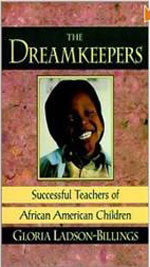 |
Ladson-Billings, Gloria. The Dreamkeepers: Successful Teachers of African American Children. Somerset, NJ: Jossey-Bass, 1994. The appendixes of this book offer methodologies from successful teachers for children in grammar school and high school. The methodologies are transferrable to a Christian education department. |
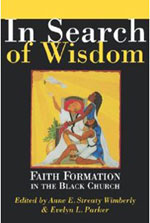 |
Wimberly, Anne Streaty and Evelyn Parker. In Search of Wisdom: Faith Formation in the Black Church. Nashville, TN: Abingdon Press, 2002. |
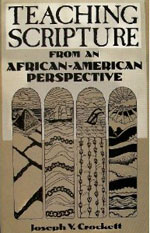 |
Crockett, Joseph. Teaching Scripture from an African American Perspective. Nashville, TN: Discipleship Resources, 1990. |
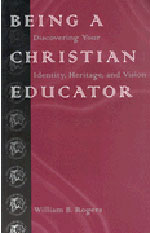 |
Rogers, William B. Being a Christian Educator: Discovering Your Identity, Heritage, and Vision. New York, NY: Smith and Helwys, 1996. |
Websites
- Urban Ministries has free classes for Sunday school teachers. Visit their website for information. You do not have to use or purchase their materials in order to attend the classes. Online location: www.umi.com
- The Auburn Institute has many resources for teachers. Online location: www.auburnseminary.org
Notes
1. Douglass. Frederick. Narrative of the Life of Frederick Douglass, An American Slave, Written by Himself. New York, NY: W. W. Norton & Company, 1997 [1845]), 29.
2. Washington, Booker T. Up from Slavery. New York, NY: Oxford University Press, 1995 [1901]), 18.
3. Paris, Peter J. “African American Religion and Public Life: An Assessment.” Cross Currents, Fall 2008, Volume 58, Issue 3, pp. 475–494.
4. Kelly, R. Love Letter. New York, NY: Jive, 2010.



